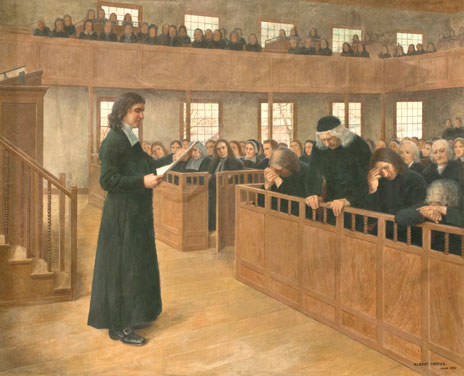Eve LaPlante
Biography, history
Samuel Sewall was the only one of the Salem judges to publicly repent. An image of the event is now in the Massachusetts State House:
 |
| Image hosted at malegislature.gov |
LaPlante's biography, it must be said, doesn't really delve into those larger meanings. It's a nice, readable write-up based on Sewall's own extensive diaries, rather like the better class of Wikipedia article done up to book length. It's at its strongest when it recreates the extraordinary physical and mental worlds of late-17th-century New England. It's at its weakest when LaPlante resorts to wholesale quotations from other authors (a venial sin that's hardly unique to her). I was especially intrigued by the period hymns sprinkled through the pages, but unfortunately I don't read enough music to really get the feel of the pieces.
LaPlante also argues that Sewall's repentance moved him towards a kind of pre-Enlightenment position vis-a-vis women, slaves, and Indians. Based on the writings of his that she includes, that's a little generous. However, Sewall--though his understanding of the world is stunningly alien--seems to have been a pretty decent fellow, overall, so I'll give him and LaPlante the benefit of the doubt.
No comments:
Post a Comment